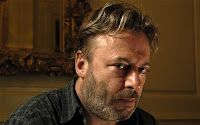THE DAILY TELEGRAPH: The controversial author was a brilliant but challenging conversationalist, as Telegraph writer Mick Brown discovered earlier this year.
When I interviewed Christopher Hitchens at his home in Washington in February, the discussion – sadly, inevitably – turned to the subject of mortality. He and a friend, he said, contemplating their demise, had mused that there would come a day when the newspapers would come out and they wouldn’t be there to read them. “And on that day, I’ve realised recently,” he went on, “I’ll probably be in the newspapers, or quite a lot of them. And etiquette being what it is, generally speaking, rather nice things being said about me.” He shrugged. “Just typical that will be the edition I miss.”
As a journalist, polemicist, author and indefatigable man of letters, Hitchens devoured the written word as much as he exulted in it, and he would be enjoying the obituaries and tributes in today’s newspapers, dwelling on his fiercely brilliant intellect, the grace and elegance of his language, his combative nature and his raffish charm. Hitchens took a characteristically robust approach to eulogy and remembrance. He could be generous in his praise – he once lionised Professor Freddy Ayer as “a tireless and justly celebrated fornicator”; but brutal in his condemnation: within hours of the televangelist Jerry Falwell’s passing, Hitchens was fixing him as an “ugly little charlatan”, adding that “if you give Falwell an enema, you could bury him in a matchbox”.
In a career spanning more than 40 years, Hitchens had a view on pretty much every subject under the sun, from the war in Iraq to the pleasures of oral sex. And it is odd to reflect that he should have achieved his greatest recognition and notoriety in the last years of his life for his contempt for religious belief and, more melancholically, for the courageous manner in which he faced up to his illness and impending death. Until the publication in 2007 of his book God Is Not Great: How Religion Poisons Everything, Hitchens had been, in the words of a late friend, the author Susan Sontag, “a sovereign figure in the small world of those who tilled the field of ideas” – but largely unknown outside it.
God Is Not Great changed all, making him a champion of the New Atheism, alongside such celebrated non-believers as Richard Dawkins and Sam Harris, the American neuroscientist. His growing public status as God’s fiercest critic would lend a particular poignancy to his struggle with the cancer of the oesophagus that would take his life. » | Mick Brown | Friday, December 16, 2011
